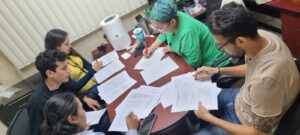
Celebrating the International Day of Women and Girls in Science
At INASP we aim to address the needs of both men and women across all of our work and acknowledge that women in particular are often confronted with a large number of obstacles in pursuing careers in research and academia. Gender barriers can take many forms, and they affect the inclusivity and sustainability of knowledge creation and use in development.
Today is the International Day of Women and Girls in Science and we would like to highlight some of the many women in the INASP network who shared their experience as researchers and scientists with us below:
Sahra Ahmed Koshin (Somalia)
Sahra is a PhD Candidate studying Somali diaspora humanitarianism in complex crises at the University of Copenhagen and at the University of Nairobi. She is also the director of the Somalia Gender Hub, a poet, and blogger. Read her blog here.
What excites you most about your research?
Research involves gathering ideas and information, it involves meeting new people and sometimes great people! It is a learning process that I do together with others that can lead to interesting insights and to potential growth. I learn by doing and working closely with others. Research means creating and applying new knowledge. All those things interest me but the one that interests me the most is the vast and diverse opportunities research offers, each time different.
What challenges have you faced, and what successes have you celebrated?
As a woman, doing research sometimes involves facing a hostile environment. Research is often seen as a man’s work. As a woman, in the field, sometimes people ask me, “where is your husband”? Another issue is that research and knowledge itself is not valued in Somalia. We don’t have reliable and systemic research that is carried out every year which we can draw from. Many reports and policy briefs are produced by different stakeholders and for different purposes and this kind of knowledge is in the hands of institutions, often NGOs. There is a lack of role models and linking up with other researchers to draw inspiration and support from doesn’t exist. The absence of research networks contributes. Many women employees would have loved an opportunity to follow a course or training on research but don’t have childcare and a supportive work environment to allow them to further their skills in higher education and in research.
As a PhD candidate, young female students sometimes come to me to ask about how I got the opportunity, how much it costs, how hard it is and what exactly a PhD leads to. I answer their questions patiently and encourage them to take up such opportunities in the future. The problem is access to information. Often opportunities are announced in small circles and only a few people benefit. This brings me to the important point of digital skills – how to look for and find opportunities such as calls for proposals, applications, online courses, scholarships and such. When you know about the existence of an opportunity, you will make a decision to apply and to profile your candidature. But if you don’t know, then you are left out. I am very happy that I engage with individuals at this very personal level. I show them where to look, where to search, and how to apply. Applying for opportunities means filling in complicated paperwork, getting references and recommendation letters, and this can be an obstacle for women Somali researchers. Helping women researchers be successful is better.
As the director of the Somalia Gender Hub we are creating awareness about the important the role of Somali women in research and knowledge production in and on Somalia. We encourage women to take up research, to further their skills and careers in research. We recently organized a two-day conference on women in higher education, research and academia. We also launched a community of practice for women in research and are currently about to launch a mentorship program for female students and junior researchers.
What would you say to women and girls who might be interested in going into your area of research?
I would say first of all believe in yourself. You will face many challenges, but you need to have a passion for what you are doing and also link with and learn from others. Finally, continuously develop your skills for research. Connect with more progressive, older women.
Dr Buna Bhandari (Nepal)
Buna is an assistant professor of epidemiology at the Central Department of Public Health at Tribhuvan University in Kathmandu, Nepal. She holds a PhD from the School of Population Health at the University of New South Wales, Australia.
What excites you most about your research?
I am always fascinated by the intriguing features of the research that helps us to explore different health issues of the society. It provides opportunities to interact with diverse groups, understand their health problems, and support evidence generation to improve the health and well-being of the people. Sometimes, research does not go as per plan; but it challenges me to think in different and innovative ways, which always excites me.
What challenges have you faced, and what successes have you celebrated?
As a female researcher from LMICs [Low-to-Middle-Income-Countries], I faced many challenges. Some of them included: time management due to multiple responsibilities, stereotypes and biases of society about the capabilities of female researchers, less funding, and collaboration opportunities for the operational research.
Despite the challenges, I could chase my dream of pursuing a PhD., thanks to the Australia Awards scholarship and many other supporting hands. I am happy to make a small contribution to science through many peer-reviewed scientific publications and dissemination of research findings at national and international conferences. Different research awards and scholarships recognized my research potential, including research student awards from the University of New South Wales, Australia; Lown scholar for cardiovascular health program from the Harvard University, USA, etc. These opportunities always inspired me to move ahead in my research activities.
What would you say to women and girls who might be interested in going into your area of research?
First, understand your research interest area and capabilities. Research needs time, commitment, and expertise as well. Take appropriate research training and find a mentor who can support and guide you. Most importantly, don’t stop if any obstacle comes in your way – believe in yourself and focus on your goals.
Dr. Bughe Rhoda Nsen (Cameroon)
Bughe is a senior lecturer at the University of Yaoundé 1 in Cameroon. Her research focuses on ‘host-pathogen-interaction’, specifically on infectious diseases of human and animal origin and control.
What excites you most about your research?
You can’t imagine that a young girl named Bughe Rhoda Nsen born into a family whose mother was an illiterate and the father who could barely read is now a holder of a PhD in Fisheries; option microbiology, and a senior lecturer in the department of Biological Sciences, Higher Teachers’ Training College, University of Yaoundé 1, Cameroon. It is a story to tell in a society where this is rare. My research domain is ‘host-pathogen-interaction’, specifically on infectious diseases of human and animal origin and control (using antimicrobial as well as bio-control approach; probiotics and bacteriophages which are still rudimentary). Our team has been investigating the prevalence and antibiotics susceptibility profile of some foodborne pathogens in seafood (Vibrio spp., Listeria spp., Aeromonas spp.) and poultry products (Staphylococcus spp., Listeria spp. and Escherichia coli) as well as Pseudomonas aeruginosa and Acinetobacter baumannii from clinical samples. We are also screening bacteria with potential antibacterial substances. Two things make this research exciting: 1) the identification of the antibiotics resistant bacterial strains of the above mentioned pathogens, and the novel approach which is to search for potential bacteria and viruses (probiotics and bacteriophages respectively); a concept that is still rudimentary in my country. It will eradicate bacterial strains resistant to antibiotics. 2) The ability to hands-on research methodology concepts and instill the art of scientific writing to young scientists in the laboratory, especially female scientists.
What challenges have you faced and what successes have you celebrated?
The process of mentorship – leading and training of people in research methodology concepts and scientific writing is not always an easy task. I came across students who were virtually lacking in some concepts necessary for their research project and this was a big challenge. I also had the challenge of training the students on how to gather scientific information in an accurate manner. I organized workshops for laboratory hands- on skills and also drilled them on scientific writing. It was not easy working with them.
Interestingly, some of the students who had very little background knowledge on the topic under investigation later gain knowledge, skills and experience, and were able to obtain an excellent mark during their master’s and postgraduate diploma defenses. These successes left a blue print on their minds and spurred them to continue with aspects of microbiology in their careers. One of the students who had a first degree in Zoology and had never been in a microbiology laboratory, carried out research on antibiotic susceptibility profile of E. coli from poultry products. Supervising him required that I start from the basic principles of microbiology laboratory practice. At the end of his project, he decided to continue his career in microbiology. Another student with a BSc in clinical biochemistry and with little knowledge in microbiology practical skills, pregnant during her bench work, investigated the occurrences and antibiotic profile of Listeria spp. from fish products and scored 90% in her master’s thesis defense.
What would you say to women and young girls who might be interested in going into your area of research?
Visualize your success and this will spur your determination to achieve. In a nutshell, there is no domain of research that is unattainable. The driving forces are the goals set out which are fueled by focus and determination. As a young girl, my poor background did not hinder me from attaining the height I am at today. There were moments in my secondary and university school days where I went virtually without food – a basic commodity, but this did not stop me from succeeding. Interestingly, the more I faced adversities, the more I was hitting the top. There is no limitation as long as you have a goal to attain.
Today, multidrug resistant microbes are a global problem both in human and animal wellbeing. I am furthering the investigation of drug resistant genes microbes and anticipating developing novel approaches to eliminate the resistance strains. I encourage young girls and women interested in this domain to develop the skill of visualizing the solution (goal) to the problem of multidrug resistant microbes; together we can focus on it and collaborate. In that way we will together eradicate antimicrobial resistance microbes in Cameroon and the world at large.
Joyce Wangari Ngugi (Kenya)
Wangari is a consultant psychologist and research mentor with 15 years of experience. She is a researcher-storyteller who enjoys mixed methods approaches to illuminate societal issues under Psychology, Deaf/Disability Studies, and Research Ethics, and has published scholarly work and media presentations in the field of diversity and disability inclusion. See her website here.
What excites you most about your research?
I am a research steward with AuthorAID, where I oversee mentorship programs for the Social Sciences Club. What excites me are generally human interest stories and particularly, psychological resilience and humor. Research is a lifestyle, where I can exercise the choice of interdependence and where I can balance collaboration with the right teams, as well as working on my own.
What challenges have you faced and what successes have you celebrated?
I have an active leadership lifestyle. The challenges are being intentional and deliberate to take rests and breaks whenever tensed or stressed, hydrating and breathing, while stretching my muscles. Sometimes, my research teams may have incidental tasks that pop up therefore, accommodating teams where tasks are erratic and unplanned can be quite some work. I try not putting too much pressure on myself, being realistic and knowing that I did my best.
What would you say to women and young girls who might be interested in going into your area of research?
I welcome more women and girls to be research mentors and leaders, in order to solve the challenges bedeviling society.
Dr Zainab Yunusa-Kaltungo (Nigeria)
Zainab is a plastic surgeon, the former chairman of the medical advisory committee (CMAC), and former Clinical Governance lead of the patient safety project at the Federal Teaching Hospital (FTH), Gombe in north-east Nigeria. Zainab also has a newsletter, which you can see here.
What excites you about your research?
The singular most important and exciting thing for any research I do is the potential impact my finding will have. Hence I prefer research that when published will make impact in clinical practice and someone would read it and say, ‘aha’! An example was a case report published about five years back. The patient had a lesion that looked like a cancer and I’d counseled her for a surgery to remove the finger after doing a test to confirm the diagnosis. I sought the opinion of several colleagues but none of them had seen the lesion before. A final literature search threw up an identical case from South East Asia. A simple cream sold over the counter saved the finger, gained me a friend for life in the patient, earned my co-author the best presentation at the national plastic surgeons’ conference, and hopefully the fingers of patients whose surgeons have read the article.
What challenges have you faced, and what successes have you celebrated?
As a doctor practicing in the developing world it is an everyday pain to see needless suffering in patients knowing simple judicious use of resources would’ve prevented or altogether solved the problems. At the same time the joy the successes we get from being creative and innovative can’t be quantified and for it contributes to slowing down the pervasive health worker burnout.
Being a researcher in my part of the world means most (in my case all) research is self funded and there’s only so much personal resources can do. Sometimes one is willing to commit personal resources just for the love of it, but if other key figures don’t buy into the vision, then you would be left to out in the cold.
My research interest is in quality improvement and patient safety (QIPS). We initiated a collaborative, multidisciplinary prospective study to document the pattern of morbidities and mortalities in surgical patients. We successfully completed the first arm as we had ethical clearance (IRB approval) and didn’t require significant participation from other parties. There was to be a follow up arm of the study to use cheap, available and proven measures to decrease surgical morbidity and mortality. We sadly couldn’t make much progress because we couldn’t get other key figures to commit and participate. So now we know the pattern of morbidity and mortality in our patients, but not how and if the known methods would help because our patient population and findings had some peculiarities from those in published studies. I however celebrate being the initiator and principal investigator, in what became an international collaboration, presenting our work at international conferences, getting calls for collaboration from other centres and creating a foundation for someone else to build on.
As a female in a male dominated specialty, the subtle and not so subtle gender biases and discrimination is something I won’t get tired of speaking about. Even if all I can do is make a dent in the problem, I can say it essentially gives permission for other women to carry on and finish.
What would you say to women and girls who might be interested in your area of research?
I say go for it and there’s joy in being forced to be creative and get meaningful results that would positively impact lives including yours.
Betelehem Bilata Woldeyes (Ethiopia)
Betelehem is pursuing her PhD at the Instituto de Astrofísica de Andalucía, Spain. Her area of interest is multiwavelength study of active galaxies, galaxy formation and evolution and the nuclear activity in galaxies.
What excites you about your research?
I studied physics for my bachelor’s degree and worked as a graduate assistant at the university after graduating, giving small lectures for the first year university students. Then I started studying astronomy and astrophysics. Being in science is about discovering new things, trying to understand why things work. It’s fun to try to answer these questions. It’s very exciting for me to search for something new, or to figure out how things work in the universe. And by itself, studying the universe is very exciting. You become more curious when you see how galaxies work, how the stars work, how they were formed. And now for my PhD, we are working on the formation of galaxies. You can sit down and see how planets and stars form or how they evolve. You have to make your own laboratory to understand things, and treat it like a puzzle to see how it all fits together. And this in turn makes you more curious. This is one of the exciting things about my research, studying astronomy and doing research in the field.
What challenges have you faced, and what successes have you celebrated?
My mum and my family were very supportive of my education, which isn’t always the case, especially in developing countries – I grew up in Ethiopia. Girls often don’t get support in their studies, especially when they study science. It’s hard to escape from a society or environment that is not encouraging. In my case I was very lucky – my parents, especially my mum, are very supportive of me and my siblings to study. That helped me become the person that I am today. Everything starts from there, right? Even if you have opportunities on offer – if you grew up in the belief that you can’t do something, or that women are not allowed to do something, you can get offered an opportunity but you might lack the confidence to take it.
I went to Debre Berhan University, where students came from different regions across Ethiopia, with different cultures and different beliefs. I faced a big challenge with this – I thought, I’ll study physics, with mostly boys, but it’s not a problem. But some people I met thought this is just something to do for boys – solving equations and so on. The girls sought support from the boys in math and in group work. And this was a big challenge for me. You start to doubt yourself. What I think is: we don’t have to connect every failure, every success with a gender. If I fail, it’s not because I’m a woman. When you are researcher, or scientist, sometimes you fail, you try, you fail, you try. And finally you get success. But it’s the same for both men and women. It’s not related to gender. When I fail, some people still think, “okay, that’s because women can’t do these things.” At the beginning this was a big challenge for me, but I got through it.
I believe it helps women to have a role model. During my master’s degree, I had a supervisor, a woman, and she was very encouraging. She works hard to empower women. One challenge I faced was that I thought I was not smart enough to apply for my PhD, especially with people from developed countries applying, who had access to better education systems. My supervisor encouraged me to apply for a scholarship, and to try anyway, saying, “if you don’t get it, you will try another time until you get it”. In every step I had encouragement. So that’s what I’m now trying to do, to mentor others. Whatever level you are at, you have to encourage others. For example, I have a younger sister, so I can be her role model; I have to encourage her to be whatever she wants to be.
I’m now bold enough to try new things. Like I said before, I was afraid to go after things and apply for scholarships, but I learned that it’s not scary anymore when you start doing things. There are still things I don’t know and I have to learn from scratch, but as a scientist, or as a researcher, you figure it out by doing it, by trying things out. I encourage myself now and here I am, doing my PhD.
What would you say to women and girls who might be interested in your area of research?
I would say go for it. If you are interested in studying something, do it even if you face challenges in that area. I’m in astronomy and astrophysics, and in some countries, that seems like a “fancy” science. Whether you’re a girl or a boy, go for it. If you face a failure, it’s not because you’re a woman – everyone fails. It’s always good to ask for help – from your mentors, or older people who have already gone through the path you’re on. And just go forward. Don’t wait for people to say, “It’s okay, you’re doing great.” You might not always get this kind of encouragement, so you have to always encourage yourself. Say, “okay, I can do this.” And when you fail, then it’s also okay – it might have been the wrong way. So you’re going to try it another way.
Studying astronomy is very exciting. If you enjoy studying science, if you like doing things, figuring things out, and trying to find solutions for problems to help people solve a puzzle, do it. If you’re excited to do it, nothing will stop you.
Title photo credit: Unsplash.com – Centre for Disease Control and Prevention (CDC)

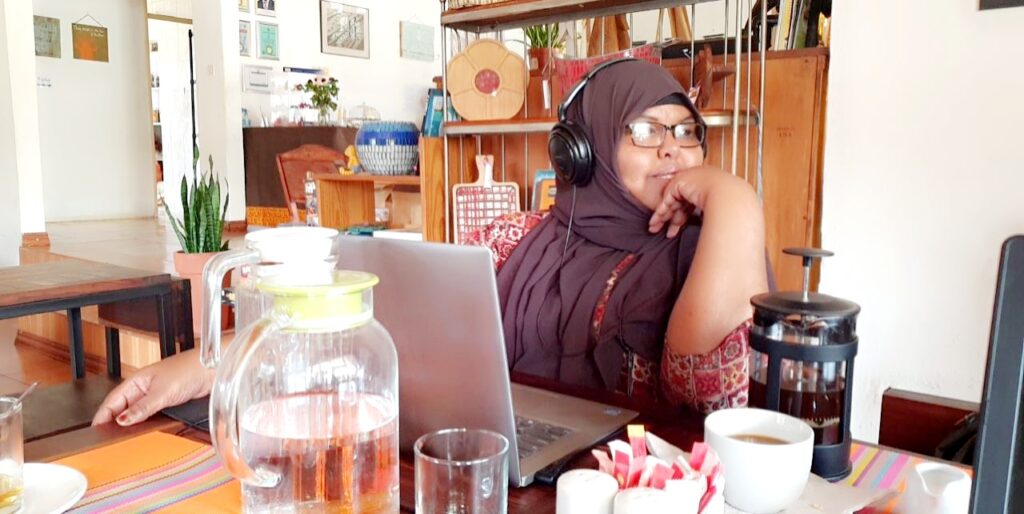
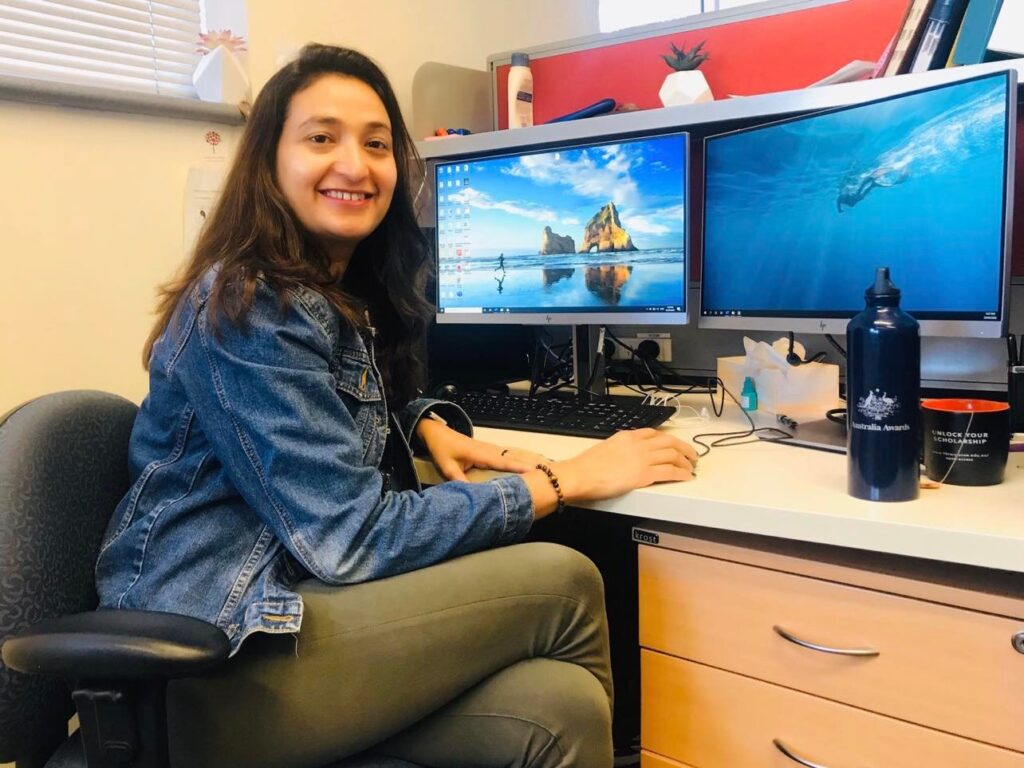
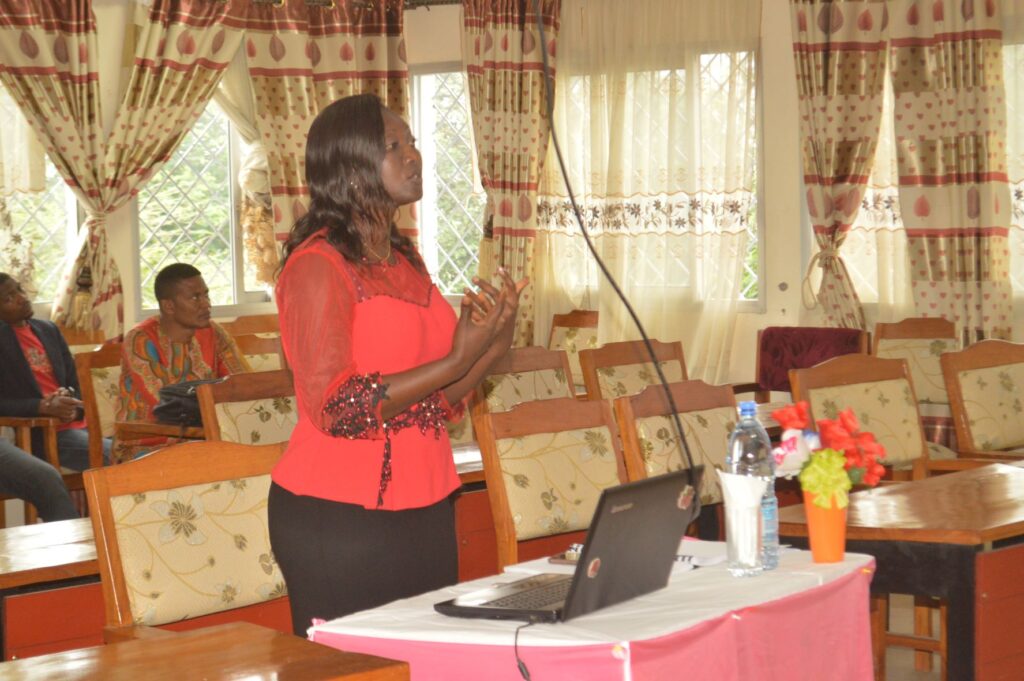

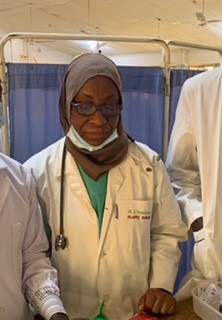
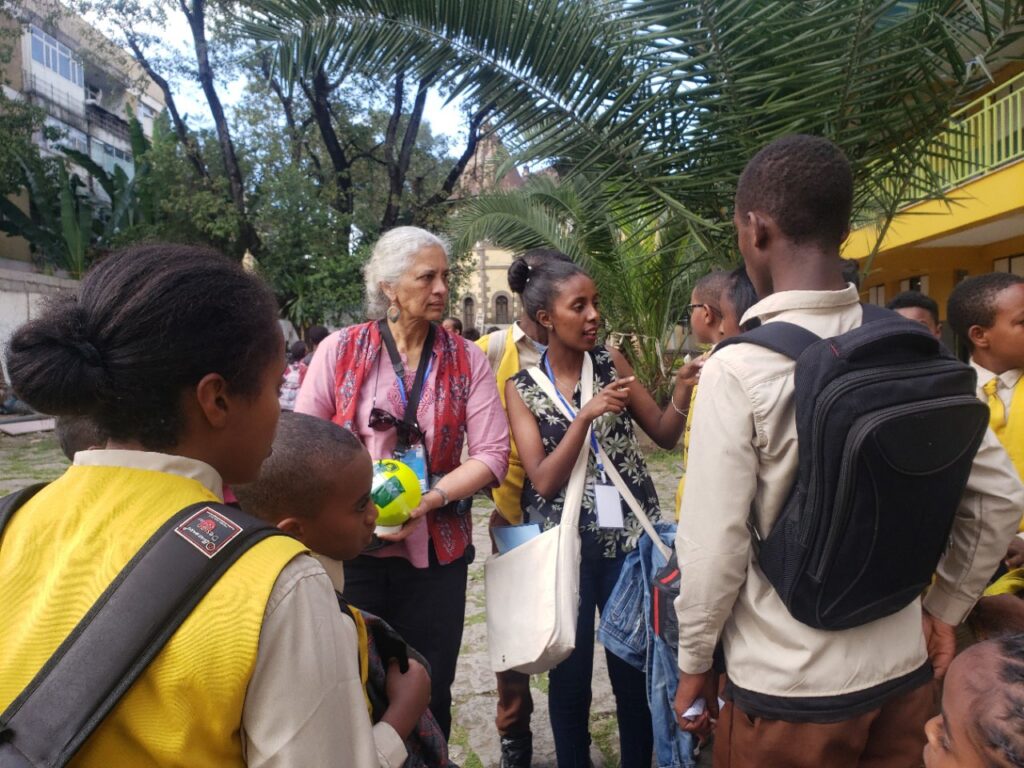
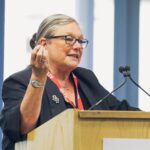 Previous Post
Previous Post Next Post
Next Post
